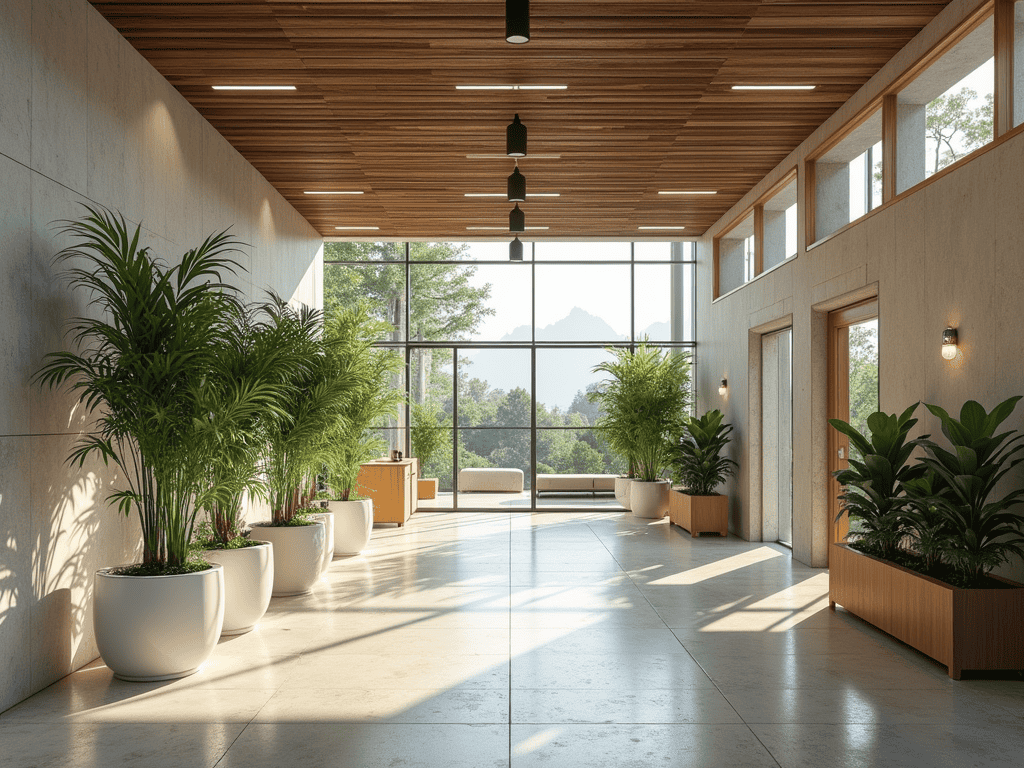When it comes to commercial spaces of any size, sustainability is no longer a mere trend. This is because, for many up-and-coming enterprises, it is at the core of what they do these days. Consequently, in small commercial spaces, incorporating sustainable materials is often a high priority for us. Doing so can significantly reduce environmental impact while enhancing functionality and aesthetic appeal. The introduction of carbon-negative materials and regenerative materials offers businesses an innovative way to revolutionise their workspaces. By adopting these cutting-edge solutions, companies can create spaces that not only align with their sustainability goals but also showcase their commitment to environmental responsibility.
At Virtus Contracts, we specialise in integrating these advanced materials into fit-out projects, helping businesses achieve greener, more forward-thinking spaces.
Understanding Carbon-Negative and Regenerative Materials
We get asked about how we can help businesses convert their smaller commercial spaces in a sustainable way all the time. The following overview will help you to understand our use of sustainable materials.
What Are Carbon-Negative Materials?
Carbon-negative materials go beyond being neutral carbon by sequestering more carbon than they emit throughout their lifecycle. Examples include bio-based concretes, hempcrete and certain innovative composite materials. These materials actively reduce the carbon footprint of construction projects, making them ideal for fit-outs.
What Are Regenerative Materials?
Regenerative materials are designed to restore and rejuvenate the environment. These materials, such as reclaimed wood, mycelium-based composites or natural fibres, contribute to ecosystem health while serving functional purposes. By integrating these types of materials, smaller commercial spaces can adopt a truly eco-friendly approach.
How Do These Materials Impact Small Spaces?
For small commercial spaces, the use of sustainable materials like these is particularly transformative. They optimise environmental benefits while being adaptable to compact layouts. With the guidance of experts like Virtus Contracts, these materials can be seamlessly integrated into designs, balancing sustainability with practicality.
Key Benefits for Small Commercial Spaces
Small commercial spaces can significantly lower their environmental impact by adopting carbon-negative materials and regenerative materials. These materials actively sequester carbon and restore ecosystems, going beyond traditional sustainable practices. For example, bio-based concretes absorb more carbon than they emit, while reclaimed timber minimises waste by giving old materials new life. Incorporating such solutions allows businesses to align their operations with sustainability goals and contribute positively to the planet.
Investing in sustainable materials delivers considerable cost savings over time. Durable options reduce the need for frequent repairs or replacements, lowering maintenance expenses. Energy-efficient materials, such as natural fibre insulation, can also reduce utility costs, offering long-term savings. Many small businesses can further benefit from incentives like green grants or tax relief schemes, making the financial advantages even more compelling.
Choosing regenerative materials enhances a company’s brand image by demonstrating a strong commitment to environmental responsibility. This resonates with clients, employees and stakeholders, helping businesses build trust and loyalty. Additionally, many of these materials, such as natural paints or mycelium composites, improve air quality and create healthier indoor environments. This not only benefits employees but also aligns with the growing trend of prioritising wellness in the workplace.
Practical Applications in Fit-Outs
Sustainable materials like reclaimed wood, bio-based concrete and natural fibre insulation are ideal for small commercial spaces, offering durability and eco-friendliness. These materials can be used in flooring, walls and furniture to enhance functionality while reducing environmental impact. Virtus Contracts integrates these solutions seamlessly into designs, ensuring practicality and cost-efficiency.
In smaller spaces, modular furniture from recycled materials and mycelium-based partitions provide smart, sustainable solutions. These innovations balance aesthetics with functionality, making them perfect for compact layouts. Virtus Contracts works closely with clients to apply regenerative materials in ways that reflect their goals and values.
Case Study: 80 Cheapside – Sustainable Transformation
At Virtus Contracts, sustainability is at the core of our approach to fit-out projects, as demonstrated in the 80 Cheapside transformation. This project involved converting a 9,500 sq ft dilapidated office floor into a contemporary Cat A+ workspace. By prioritising the use of sustainable materials, we reduced the environmental impact while delivering a high-quality, functional design.
A key focus was repurposing and recycling existing materials to minimise waste. Rather than sourcing all-new materials, the project incorporated innovative ways to reuse elements from the existing structure, significantly lowering the carbon footprint. This approach aligned with the principles of regenerative materials, turning potential waste into valuable resources.
The result was a sleek, open-plan office that met the client’s needs without compromising on sustainability. The 80 Cheapside project highlights how adopting low-carbon materials and eco-friendly practices can revolutionise small commercial spaces, creating environments that are both practical and environmentally responsible.
Explore how Virtus Contracts can transform your commercial space with sustainable, innovative solutions tailored to your needs. Get in touch today or review our past projects to see how we bring eco-friendly design to life.
Address
Virtus
Unit 9 The Circle
Queen Elizabeth Street
London, SE1 2JE
Telephone
We would love to hear from you
Please fill out the form below if you would like to contact us




